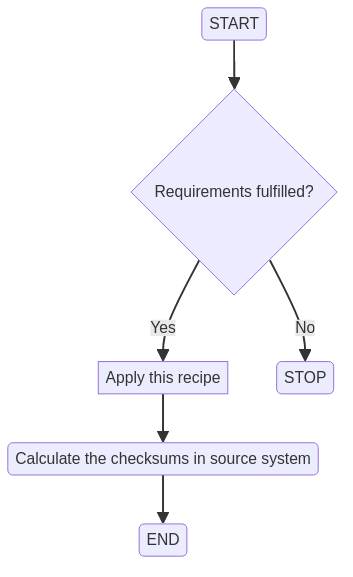7. How to create checksum files¶

7.1. Abstract¶
When copying a file (“source file”) to a target location, it may become necessary to confirm that the actual content, i.e. the bits that make up the information, arrived correctly in the target system. Confirming the identity of two different files may be achieved by calculating a so-called checksum of the file in the source system, calculating the checksum in the target system, and comparing the outputs. The checksum is a proxy of the content of the file, but is much shorter. Because the algorithm is previously agreed on and shared between the source and target system, the comparison of the checksum indicates whether the files are identical (within some limitations).
7.3. Requirements:¶
This recipe assumes the following:
both source and target systems have the Linux operating system, preferentially Debian (no root access needed)
you have basic knowledge of how to use a terminal (called “shell”, this can be bash or similar)
the tool
md5sumis installedthe source and target files are both placed in your respective home directories; we assume they are called
file_to_compare.txt(replace this filename as necessary in the recipe instructions; you can download a demo file from here:./checksum-create.md-file_to_compare.txt(remember to rename it tofile_to_compare.txt)for the more complex example (compare many files): the source and target files are both placed in a directory called
path_to_directorywithin your home directory; we assume that this directory contains many image files with arbitrary names, but all with the common file extension.jpg.
Checking the requirements (tests):
Start up a console. Type
md5sum --version
and hit return.
You should see as output:
md5sum (GNU coreutils) 8.30 Copyright (C) 2018 Free Software Foundation, Inc. License GPLv3+: GNU GPL version 3 or later <https://gnu.org/licenses/gpl.html>. This is free software: you are free to change and redistribute it. There is NO WARRANTY, to the extent permitted by law. Written by Ulrich Drepper, Scott Miller, and David Madore.
Execute on the console:
ls ~/file_to_compare.txt
The output should be something like:
/home/USERNAME/file_to_compare.txt
where
USERNAMEis your username on the computer system. The output should NOT be something like:ls: cannot access '/home/USERNAME/file_to_compare.txt2': No such file or directory
Execute on the console:
ls -1 ~/path_to_directory/*.jpg
You should see a list of all image files. The output should NOT be something like:
ls: cannot access '/home/USERNAME/path_to_directory/*.jpg': No such file or directory
7.4. Recipe instructions¶
7.4.1. Generating the checksums¶
On the shell execute:
md5sum ~/file_to_compare.txt
The output should be:
c691b3d2fc2678839a9c141b6ee1524e /home/USERNAME/file_to_compare.txt
7.4.2. Storing the checksums in a dedicated file¶
On the shell execute:
md5sum ~/file_to_compare.txt > ~/checksums.md5
You will not get output for this command.
Execute:
cat ~/checksums.md5
The output should be:
c691b3d2fc2678839a9c141b6ee1524e /home/USERNAME/file_to_compare.txt
7.4.3. Calculating the checksums for all files in one directory¶
On the shell execute:
md5sum ~/path_to_directory/*.jpg > ~/checksums.md5
There will be no output; however, this command may take a while to execute.
For 60 pictures of 3.5 MB each, this command took 1.6 seconds on a MacBook Pro (2017) with a SSD drive.
7.4.4. Limitations of this recipe¶
This recipe in its current form has the following limitations:
the above assumes that everything is placed in your home folder. (for a resolution see section “Extendability of this recipe” below.)
the above assumes that you don’t have a problem with calculating the checksums sequentially. Depending on your system’s resources (especially available CPU time), this calculation of checksums might take a while, however. A common benchmark on a typical laptop is: 0.01 seconds per MB of data.
you should mind the general limitations of checksums, which are however not covered in this recipe.
there is a known clash between the output format of the GNU / Linux tool
md5sumand the macOS / BSD toolmd5. Their standard output formats are incompatible; combining a macOS-based system with a Linux-based system, either one as source or target, is therefore not straightforward. (hint: the Linux tool has the--tagflag which generates macOS-compatible output.)Windows users may use the included PowerShell function “Get-FileHash”
the recipe assumes that the absolute paths of the files are the same on source as well as on target system. If necessary for the use case, the “relative mode” by executing e.g.
md5sum ./*can be used to circumvent problems with absolute paths.md5is the most common hashing algorithm, but is also known to have vulnerabilities for checksum hacking (see https://en.wikipedia.org/wiki/MD5#Security), and has obviously also higher collision frequencies than functions which generate longer hashes, e.g.sha512.
7.4.5. Extendability of this recipe¶
The tool above could be used to calculate checksums in parallel if typical scheduling systems and multiple worker nodes are available sharing the same file system (equivalently, this would be possible in a cloud architecture).
the recipe assumes that everything is placed in your home folder. If this is not the case, replace
~, the home directory indicator, by the corresponding path, or execute specifically allmd5sumcommands only with relative pathes (by navigating in the corresponding directory, first). The command will be something likemd5sum ./YOUR_PATH_HERE/*.jpg, then, and will output something likec691b3d2fc2678839a9c141b6ee1524e ./YOUR_PATH_HERE/picture1.jpgthen.The procedure above could be combined with a file length indicator (usually the amount of octets = bytes); the file length is usually retrieved much faster than the checksum, and might already indicate the inequality of two files (albeit similar file length does not guarantee content-identity, of course).
7.5. Further reading¶
Wikipedia article on checksums: https://en.wikipedia.org/wiki/Checksum
Wikipedia article on the algorithm
md5: https://en.wikipedia.org/wiki/MD5Wikipedia article on the tool
md5sum: https://en.wikipedia.org/wiki/Md5sum

Learn more about:
7.6. References¶
References
7.7. Authors¶
Authors
Name |
ORCID |
Affiliation |
Type |
ELIXIR Node |
Contribution |
|---|---|---|---|---|---|
Bayer AG |
Writing - Original Draft |

